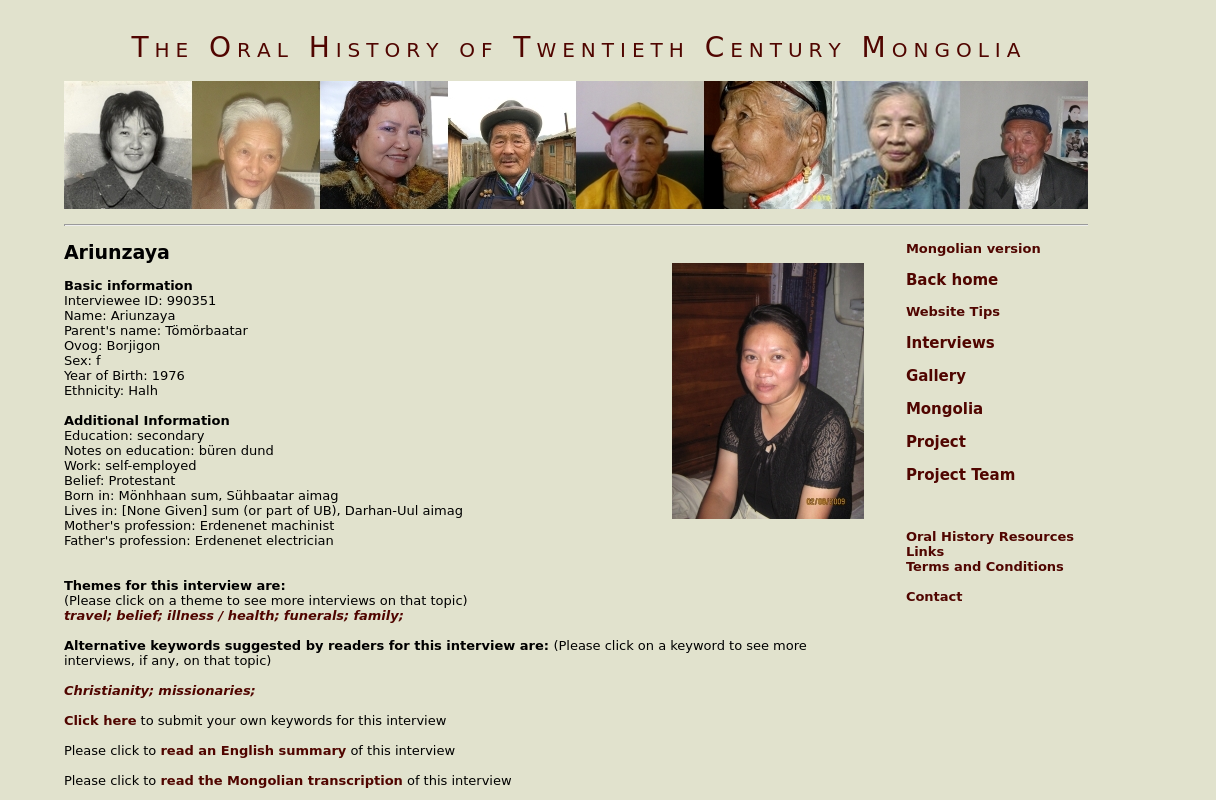Oral history interview No. 090759B with Ariunzaya (b. 1976): translation
Metadata
collection
The Oral History of Twentieth Century Mongolia
identifier
e677edf2-583d-4baa-8037-dd86dd736472
creator
type
coverage
description
Ariunzaya egch told how she established a congregation [tsuglaan] in Dornod aimag. Her uncle lived in Dornod, which is why she went there by car in 1996. In Dornod she got in touch with the first [Christian] believer there Ganzul egch and went to her place. She told her the purpose of her coming and said she wished to spread the Good News to many people. She met a person called Nyamdelger and they rented a place for a meeting. Four or five people came to the first meeting and the next meeting they decided to hold at Nyamdelger egch’s place. Thus, the family numbers increased that believed in the Lord. She told about taking care of her sister in Christ Nandia’s granny. The granny died in 1998 and all her relatives except Nandia had it in mind to bury her according to the Buddhist ceremony therefore it was done accordingly. There was a gap between rich and poor in Dornod and mostly the poor came to believe in the Lord. Ariunzaya has met kind-hearted people who weren’t disappointed in their lives. Ariunzaya egch didn’t work in Dornod but only spread the Good News. Also, one Korean whose name was Yon Chol came with his family to Dornod and he assisted them. Ganzul egch of their church fried yoposhig and waited for them to come and then they ate together having prayed to God. The inflation rate was high then and life was tough but everyone overcame it all by their faith in the Lord. Yanjmaa egch’s son passed away at the age of twelve months. Yanjmaa egch’s parents-in-law also wanted to bury the child according to the Buddhist tradition but she absolutely resisted it and the burial ceremony was carried out according to Christian customs. Ariunzaya had never experienced a Christian funeral ceremony before, so she was in a panic but the child was buried in a beautiful place. Later Yanjmaa egch’s parents relented and they expressed their gratitude. Ariunzaya egch came back from Dornod in 2000. Since 1998 she has lived a settled life there and she worked in her elder sister’s store. She lived at her elder sister’s and she helped her family. Ariunzaya egch’s relatives assisted her by sending money from Ulaanbaatar. Later she looked after the children of her relatives who caught fish from lake Buir and sold it to the Chinese. She received a salary from them. She married her husband and they lived in Erdenet. They have accepted themselves as the brother and the sister loved by God. The best memories of her life were in Dornod, said Ariunzaya.
publisher
Oral History of Twentieth Century Mongolia
source
rights
Copyright MIASU. Reproduced with permission. Brief excerpts from interviews and other material may be used in academic or popular work for non-commercial purposes provided proper attribution and credit is given to the Oral History of Twentieth Century Mongolia and the Mongolia and Inner Asia Studies Unit (MIASU). You must not: (a) republish this material (including republication on another website) without the express written permission of MIASU; (b) sell, rent or sub-license material from the website; (c) show any material from the website in public without attribution to The Oral History of Twentieth Century Mongolia; (d) reproduce, duplicate, copy or otherwise exploit material on the website for a commercial purpose without express written permission; (e) use the material in any way that is damaging to the project or any of the persons named in the interviews. See http://amantuuh.socanth.cam.ac.uk/terms.php for details.
subject
date
2009
language
files
| df-pdf | 180.2 KiB | 2017-05-29 12:11:12 | |
| df-screenshot | png | 28.9 MiB | 2017-05-29 12:11:12 |
| metadata-en | docx | 508.4 KiB | 2018-01-08 14:57:28 |
